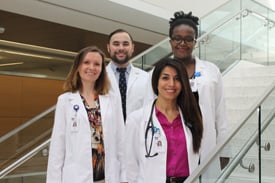
The first graduating class of UMass Chan’s BSN to DNP program is (from left) Hanna Roy, Shaun L’Esperance, Afsaneh Lomax and Anne Kiraithe.
In 2011, registered nurses Anne Kiraithe, Afsaneh Lomax, Shaun L’Esperance and Hanna Roy were admitted to the first class of the Graduate School of Nursing’s new, accelerated Bachelor of Science to Doctor of Nursing Practice program. Now possessing unique qualifications that make them pioneers in today’s dynamic health care landscape, members of the Class of 2014 are poised to achieve many more firsts in their careers upon receiving their diplomas at Commencement on Sunday, June 1.
“As a new commodity on the job market, the career path will be unique for each of us,” said L’Esperance.
Wishing to expand their nursing knowledge and professional roles by becoming nurse practitioners, L’Esperance, Kiraithe, Lomax and Roy all considered the traditional Master of Science in Nursing program, but chose the new BSN to DNP program in order to attain the highest level of advanced practice nursing training available. Equipped with their practice doctorates, they now look forward to providing primary care to patients and communities as family nurse practitioners, as well as assuming leadership and policymaking roles in primary care and urgent care settings.
“We are trained to identify practice problems and review the research literature for the best evidence to address them in order to improve quality of care and patient outcomes,” L’Esperance continued. “With the DNP, what we bring in addition to the advanced practice clinical role is leadership in advanced concepts of health policy, population-based care, epidemiology, biomedical informatics and clinical research-based methodologies.”
An alternative to research-focused doctoral programs such as the PhD in nursing, theDNP is a practice-focused doctorate. DNPcurricula build on traditional master's programs with additional education in evidence-based practice, quality improvement and health systems leadership. A capstone project that synthesizes these skills to measurably improve the quality of care and outcomes for patients in a particular setting is a requirement for the degree.
The Class of 2014’s capstones exemplify the Doctor of Nursing Practice in action, and demonstrate the added value each will bring to health care and, most importantly, to their patients.
Coming from a background where medical professionals are in limited supply, Kenya native Kiraithe decided to engage with community health workers— lay people who volunteer to educate members of their own underserved communities about health issues. She did this at Central Massachusetts Area Health Education Center where community health workers serve many African-American and Hispanic women—who experience higher death rates from breast cancer than white women—to gain a better understanding of why patients don’t get mammography screenings. “Lessons learned included what resources are needed to increase knowledge, awareness, and participation in breast cancer screening, including talking about myths and fears of discomfort that often prevent underserved women from getting a mammogram,” said Kiraithe.
For her capstone, Lomax conducted a performance improvement project at a community health center to improve hypertension control using a collaborative team approach. She did this by engaging and elevating the role of the clinic’s nursing staff. “I put together an algorithm for hypertension management which allowed patients access to weekly nurse-visits and